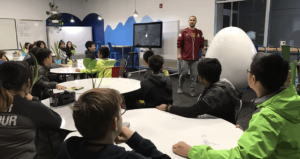An Innovation Ecosystem Meets in Austin for SXSWedu

“An Innovation Ecosystem in Austin” by Arthur VanderVeen was first seen on the Navigator by Compass Learning. VanderVeen is the Vice President of Business Strategy and Development at Compass Learning.
Key leaders in Austin will be meeting this week as part of SXSWedu to develop strategies for expanding Austin’s role as a national leader in ed tech innovation. Karen Cator, Director of the US Department of Education Office of Educational Technology, will share insights into how other cities like San Francisco and New York are creating innovation ecosystems to accelerate the development of next-generation learning technologies. The theory of action behind these initiatives is the commitment to match smart demand from informed customers (e.g., school districts and CMOs) with smart entrepreneurs and investors to create innovative new solutions that actually solve schools’ problems.
Removing the barriers that inhibit greater innovation in our schools is capturing the attention of many smart thinkers and organizations that take a systemic view on education reform. Secretary Duncan’s Chief of Staff Joanne Weiss effectively identifies the mismatch between what the marketplace develops and what schools need. Kim Smith and Julie Petersen at Bellwether Education Partners identify the critical role that informed school districts must play to pull innovation into their systems. And Digital Promise, a new private–public partnership created by Congress, is working to spur innovation by matching smart demand with smart supply through its League of Innovative Schools.
Austin has tremendous advantages for establishing its own brand of ed tech innovation ecosystem — a strong technology community, tier-one research institutions, an active angel investor and venture capital community, philanthropic foundations committed to innovation in education, progressive state education policies that support competency based credit and flexible use of instructional materials funding, deep creative and artistic talent, and a world-class annual festival showcasing ed tech innovation. By committing to formalizing its own regional innovation ecosystem, Austin and its surrounding districts can not only accelerate innovation locally in their own schools, but become a proof point for spurring greater innovation nationally.
What do you think of Austin as an ed tech innovator, both now and into the future? Please share your thoughts below.






0 Comments
Leave a Comment
Your email address will not be published. All fields are required.